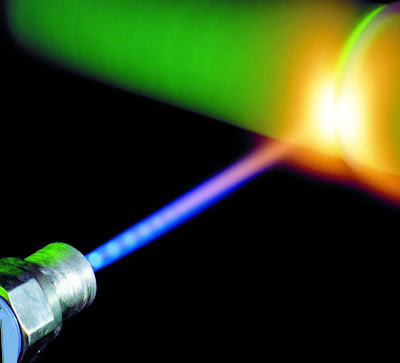
Ford Motor Co. and researchers at the University of Liverpool are developing a laser based car ignition system that reduces emissions and may help the widespread adaption of biofuels.
The team has just received nearly £200,000 (US$320,000) in grants to test the technology from the Carbon Trust, a government funded entity charged with helping businesses in the transition to a low carbon economy.
Ford reportedly plans to install the laser ignitions in a select range of vehicles in the next few years before expanding the laser ignitions on a larger scale. The laser ignition may also overcome a significant barrier to widespread adoption of biofuels -- starting the vehicle when the engine is cold.
The operation of internal combustion engines with lean gas-air mixtures, high
cylinder head pressure and plasma spark ignition has been shown to increase fuel efficiencies and reduce green-house gas emissions by significant amounts. Internal combustion engine laser ignition studies indicate fuel efficiency increases of greater than 45% and NOx-emission reductions of more than an order of magnitude when compared to standard spark-gap spark plug performance
Running lean (lean-burn) lowers the combustion temperature and significantly reduces the amount of NOx produced. As the demand for higher engine efficiencies and lower emissions drive reciprocating engine combustion to leaner air/fuel operating conditions, increased spark energy is required to maintain stable combustion and low emissions Delivering increased spark energy negatively impacts spark plug durability and the effectiveness of the spark plug in transmitting adequate energy as an ignition source. The lack of spark plugs with the required durability is quickly becoming the limiting factor for developing ultra low emission, high-efficiency natural gas engines. Laser ignition delivers the high energy required to ignite ultra-lean mixtures and eliminates the need for spark plugs. 
The laser is directed toward the combustion chamber through a thin fiber optic cable in place of a conventional spark plug. Reflecting part of the laser back from inside the cylinder can deliver information on fuel type and ignition level to allow vehicles to optimally adjust the air/fuel mix. The laser ignition spark plugs are more reliable than a traditional electric discharge spark plug.
Fundamental studies on laser ignition have been performed by the US Department of Energy under ARES (Advanced Reciprocating Engines Systems) and by the California Energy Commission under ARICE (Advanced Reciprocating Internal Combustion Engine).
Latest Cars Technology and News Around the World.
Cars Type
- Aprilia (1)
- Arai Helmets (1)
- Aston Martin (2)
- Astra (1)
- Audi (16)
- Benelli (1)
- Bentley (2)
- BMW (21)
- Bugatti (2)
- Car Artist (3)
- Car Machines (3)
- CAR NEWS (45)
- Car Tips (2)
- Chevrolet (6)
- Daihatsu (1)
- Ducati (4)
- Ferrari (7)
- Fiat (2)
- Ford (5)
- General Motors (4)
- GMD (1)
- Harley-Davidson (2)
- Honda (21)
- Hyundai (5)
- Jeep Wrangler (1)
- Kawasaki (2)
- KIA (8)
- Lamborghini (4)
- Land Rover (5)
- LeoVince (1)
- Lexus (5)
- Lotus (3)
- Maserati (1)
- Mazda (9)
- Mercedes Benz (15)
- Michelin (1)
- MINI German Car (2)
- Mitsubishi (4)
- Motorcycle News (1)
- MV Agusta (1)
- Neora Electric (1)
- Nissan (6)
- Peugeot (3)
- Porsche (4)
- Shelby (1)
- Smart For-Us (1)
- Subaru (4)
- Suzuki (3)
- Technology (6)
- Tesla Motors (2)
- Toyota (13)
- Volkswagen (11)
- Yamaha (3)
Blog Archive
© Copyright 2011 - 2012 LATEST CAR NEWS. Design By Latest World News





